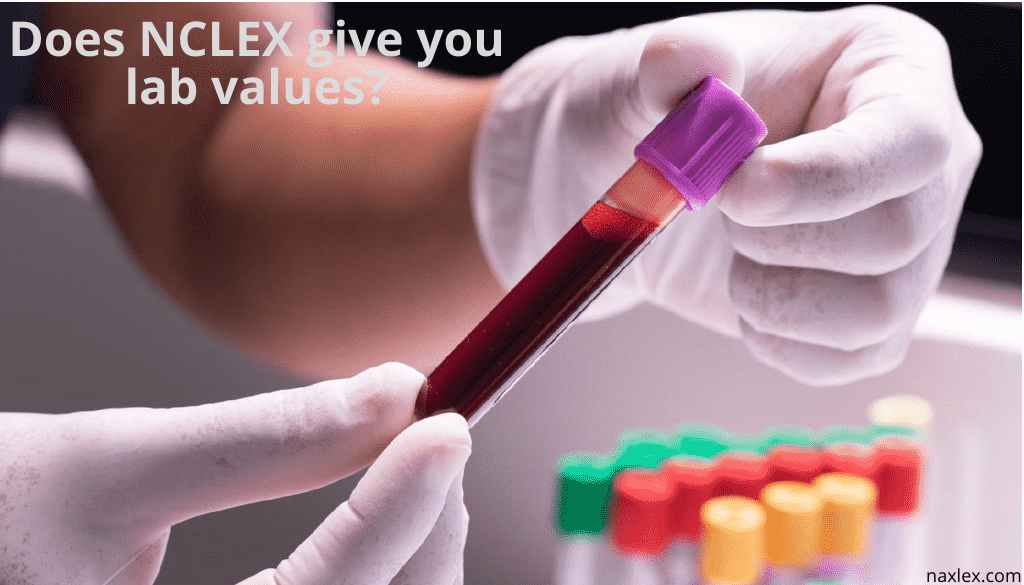Laboratory or lab values entail checking body samples such as blood, urine, and tissues to evaluate patient health. One of the frequent questions candidates have is whether the NCLEX gives lab values during the exam. Understanding whether lab values are given in the NCLEX can significantly impact a candidate’s preparation and eventual performance. This article explores the lab values in the NCLEX and strategies to prepare for this aspect of the exam effectively.
Lab values play a significant role in the delivery of safe and effective healthcare. For nurses and healthcare teams to analyze lab values effectively, they must be well-prepared academically. A great resource helping thousands of nursing candidates prepare for NCLEX and the nursing profession is the Naxlex. If you want to save time and resources in your test preparation, try Naxlex for a guaranteed A or 100% money back.

Naxlex NCLEX-RN is now live!
➕ 10+ Tutored CATs
➕ 5+ Readiness Exams
➕ Comprehensive reports
➕ 14-Day Free Trial until 30th November
Are lab values given on the NCLEX?
One of the key concerns for candidates is whether the NCLEX will give lab values within the questions. The answer is that it depends on the context of the question. In some instances, the NCLEX may provide specific lab values, especially when the question is designed to assess the candidate’s ability to interpret those values in relation to a patient’s condition. However, not all questions will include lab values, and candidates need to be familiar with common lab values to answer the questions accurately.
Situations where lab values are given
NCLEX gives lab values in questions that require interpretation or clinical decision-making. For example, a question might present a scenario where a patient has a certain set of symptoms, and the candidate is asked to determine the next best action based on the provided lab values. In such cases, the NCLEX will give the relevant lab values needed to make an informed decision. As a nurse, you need to familiarize yourself with these values for effective nursing interventions.
Situations where lab values are not given
In other scenarios, the NCLEX may not give lab values, expecting the candidate to know the normal ranges and their implications. Questions might ask about the significance of a lab value or the potential effects of an abnormal result without explicitly providing the numbers. For example, a question might ask what action should be taken if a patient’s potassium level is high without stating the specific level.
How the NCLEX gives lab values
The NCLEX exam is organized into four major client needs categories and their corresponding subcategories, which are:
- Safe and Effective Care Environment
- Management of Care
- Safety protocols and Infection Control
- Health Promotion and Maintenance
- Psychological Integrity
- Physiological Integrity
- Basic Care and Comfort
- Pharmacological and Parenteral Therapies
- Reduction of Risk Potential
- Physiological Adaptation
NCLEX will give you lab values within the reduction of risk potential subcategory. This subcategory evaluates whether nurses can reduce the risk of their clients developing health problems or complications, including by performing diagnostic testing and monitoring outcomes.
The current NCLEX test guide asks candidates to determine laboratory values for arterial blood gasses (ABG) (pH, PO2, PCO2, SaO2, HCO3), blood urea nitrogen (BUN), total cholesterol, creatinine, glucose, glycosylated hemoglobin (HgbA1C), hematocrit, hemoglobin, INR, platelets, potassium, PT, PTT & APTT, sodium, and WBC. Mastering this content can boost your preparedness to handle lab values given by NCLEX.
Popular lab values to know for the NCLEX
To prepare for the NCLEX, it is crucial to memorize common lab values, as this knowledge will be indispensable when answering questions related to laboratory tests and diagnosis. Some of the most frequently tested lab values include:
Complete Blood Count (CBC):
- Hemoglobin: 13.8 to 17.2 g/dL (men), 12.1 to 15.1 g/dL (women)
- Hematocrit: 40.7% to 50.3% (men), 36.1% to 44.3% (women)
- White Blood Cells (WBC): 4,500 to 11,000 cells/mcL
Electrolytes:
- Sodium: 135 to 145 mEq/L
- Potassium: 3.5 to 5.0 mEq/L
- Calcium: 8.5 to 10.2 mg/dL
Kidney Function:
- Blood Urea Nitrogen (BUN): 7 to 20 mg/dL
- Creatinine: 0.6 to 1.2 mg/dL (men), 0.5 to 1.1 mg/dL (women)
Liver Function Tests:
- Alanine aminotransferase (ALT): 7 to 56 units/L
- Aspartate aminotransferase (AST): 10 to 40 units/L
Coagulation Studies:
- Prothrombin Time (PT): 11 to 13.5 seconds
- International Normalized Ratio (INR): 0.8 to 1.1
- Activated Partial Thromboplastin Time (aPTT): 30 to 40 seconds
The impact of lab values on patient safety
Patient safety is a primary concern in the nursing profession, and the NCLEX emphasizes this through questions that test your ability to make safe and effective clinical decisions. Lab values play a significant role in aiding the clinical decision-making process. Incorrect interpretation of lab values can lead to serious consequences, such as administering the wrong medication or missing a critical diagnosis. By thoroughly preparing for lab value questions, you enhance your ability to contribute to patient safety as a newly licensed nurse.
How to prepare for lab values on the NCLEX
Given the importance of lab values in clinical practice, it is essential to prepare thoroughly for this aspect of the NCLEX. You can use different strategies, such as memorizing common lab values, understanding lab values’ clinical significance, and using practice questions and other study guides.
Conclusion: Does NCLEX give you lab values?
Many test takers ask, “Does NCLEX give you lab values?” The NCLEX exam does provide lab values in certain questions, especially those that require interpretation or clinical decision-making. However, not all questions will include lab values, so candidates need to have a strong understanding of common lab values and their clinical significance. By memorizing these values and practising with NCLEX-style questions, you can be well-prepared to tackle this part of the exam.
Understanding how lab values are presented on the NCLEX and preparing accordingly is vital for success. With the right preparation, you can approach the NCLEX with confidence, knowing that you are equipped to handle questions involving lab values and make sound clinical decisions that prioritize patient safety. A great preparation resource available to you is Naxlex. Join Naxlex today for a guaranteed A on the exam the first time.



